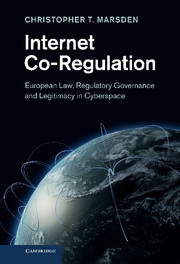Book contents
- Frontmatter
- Contents
- Acknowledgements
- Abbreviations
- Table of legislation
- 1 States, firms and legitimacy of regulation: insoluble issues?
- 2 Internet co-regulation and constitutionalism
- 3 Self-organization and social networks
- 4 An empire entire of itself? Standards, domain names and government
- 5 Content regulation and the Internet
- 6 Private ISP censorship
- 7 Analyzing case studies
- 8 Internet co-regulation as part of the broader regulatory debate
- Bibliography
- Index
1 - States, firms and legitimacy of regulation: insoluble issues?
Published online by Cambridge University Press: 07 September 2011
- Frontmatter
- Contents
- Acknowledgements
- Abbreviations
- Table of legislation
- 1 States, firms and legitimacy of regulation: insoluble issues?
- 2 Internet co-regulation and constitutionalism
- 3 Self-organization and social networks
- 4 An empire entire of itself? Standards, domain names and government
- 5 Content regulation and the Internet
- 6 Private ISP censorship
- 7 Analyzing case studies
- 8 Internet co-regulation as part of the broader regulatory debate
- Bibliography
- Index
Summary
This book aims to answer a simple empirical question in a complex environment. Is Internet regulation a paradigm of constitutionally responsive co-regulation? Within the question, I unpack first what forms of regulation are present in the governance of the Internet, based on case studies. I define and examine what responsive regulation, and specifically co-regulation, entails, and how it contributes to protecting constitutional rights within regulatory organizations. Finally, I assess the extent to which Internet co-regulation is a paradigm of such forms of regulation, as compared to, for instance, financial or environmental regulation.
- Type
- Chapter
- Information
- Internet Co-RegulationEuropean Law, Regulatory Governance and Legitimacy in Cyberspace, pp. 1 - 45Publisher: Cambridge University PressPrint publication year: 2011

